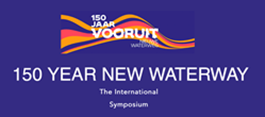
Han Meyer, Carola Hein, Paul van de Laar and Sabine Luning argue that in the current moment of major crises ship channels necessitate radical reconsideration. On 13,14 and 15 October the International Symposium 150 years New Waterway brings together academics, artists and policymakers to discuss the future of ship channels to create a new balance between economic development and a sustainable and resilient environment.
A hundred and fifty years ago the ship channel New Waterway opened in Rotterdam. The whole year Rotterdam has been celebrating this fact by focusing mainly on all the positive sides: the economic benefits, being the largest port in Europe and to show the ability to control the natural landscape. The port authorities and city appear to strive for a continuous expansion in the future. But is that the way to go forward? Han Meyer, Carola Hein, Paul van de Laar and Sabine Luning opine that in this time of major crises, ship channels require radical rethinking.

Ports play a key role in the discussion on how to deal with climate change
How to survive and how to improve the conditions so that social life can continue on this earth is very much dependent on how we act right now. There are two main reasons that ports and ports regions play a crucial role in current discussions on how to deal with climate change and the future of mother earth, says Han Meyer, Professor emeritus of Urban Design at TU Delft. 'A port region like Rotterdam is a very important player in the whole fossil fuel system of the world. Fossil fuels are transported, stored and processed. Worldwide fossil energy needs to change, so port regions play a crucial role in this transition.' The second reason is linked to the natural shape of the river. 'Since the 19th century, human intervention has changed the landscape of The Netherlands dramatically. But we are discovering that natural processes are not so easy to control. We need to find a new way how the port economy and the quality of the natural environment can be brought into a new balance and how we can diminish floodings, salt intrusions and destruction.'

We need concepts of how we want to live
LDE professor Water, Ports & Historic Cities Carola Hein stresses why a conference like the International Symposium 150 New Waterway is so important. 'We need concepts of how we want to live. We cannot solve everything with new technologies. We need to address what lifestyles we want to promote.' She sees opportunities in for example in travel in virtual reality instead of using very polluting cruise ships and by making more use of 3d printing and consuming less plastic from China. 'It's a matter of lifestyles and building systems that are in themselves circular and sustainable.' Ports per definition have been part of linear systems. They bring petroleum from Indonesia to Rotterdam, transform it and send it to Germany to the industrial hinterland to produce steel, and then send it back to Rotterdam. Hein: 'We need to think about systems where we reduce the global flows and go back to more local productions. We could create floating ports, so we can limit dredging. We need long-term visions and not just ideas that were developed 30 years ago and projected into the next ten.'

The new waterway is more than just infrastructure
History matters here, Historian Paul van de Laar says. 'The New Waterway is more than just infrastructure. Since industrialization took off, Rotterdam became very dependent on the economic developments in the hinterland.' The port 'survived' the coal transition but the dependency on the Rhine economy continued after WWII when Rotterdam developed modern industrial development areas based on the petroleumscape. However, the new challenge, the energy transition is asking for new ideas, more creative acknowledging the lock-in effects of past dependencies. 'We need a new narrative. The port authorities may portray a bright clear future based on the success of the past. In that perspective solutions are too often seen as a matter of scaling up infrastructural investments. That's a rat race. We need to think of different scenarios for the future. Smart ports may be small ports in the future.'
Comparative view
Rotterdam is key because of the celebration of 150 years New Waterway, but the conference itself has a comparative view. There will be speakers who will talk about the Suez Canal, Panama Canal, and the Houston Ship Channel. 'The forces are stronger and more encompassing than just the field of authorities and policymakers in Rotterdam. The problem of coastal and delta infrastructures is embedded in a global economy in which practices of extraction, international trade and consumption are organized', explains Cultural Anthropologist Sabine Luning. 'You cannot think of Rotterdam without considering dynamic interdependencies worldwide and economic and ecological influences from other regions and deltas. People worldwide are connected and depend on the developments in these areas. That is why this symposium is so important: it gives us a chance to work on other types of stories to create sustainable futures.'







